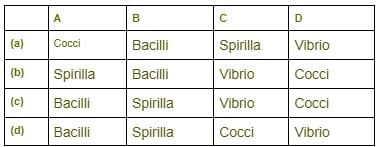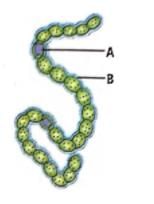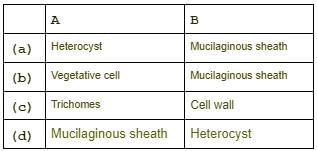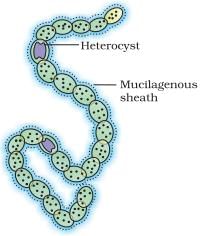15 Minute Test: Kingdom Monera (NCERT) - NEET MCQ
15 Questions MCQ Test - 15 Minute Test: Kingdom Monera (NCERT)
Bacteria are grouped under four categories according to their shape. Study the given figures and select the correct option regarding this.




Which one of the following is an incorrect statement regarding mycoplasma?
Read the following statements regarding methanogens and select the correct option.
(i) They are included in the group Archaebacteria.
(ii) They are responsible for the production of biogas in gobar gas plants.
(iii) They live in hot sulphur springs.
(iv) They are present in the gut of several ruminant animals such as cows and buffaloes
(i) They are included in the group Archaebacteria.
(ii) They are responsible for the production of biogas in gobar gas plants.
(iii) They live in hot sulphur springs.
(iv) They are present in the gut of several ruminant animals such as cows and buffaloes
Given figure is of filamentous blue green alga Nostoc Identify the parts marked as A and B and select the correct option.


Cyanobacteria are classified under which of the following kingdoms?
How do cyanobacteria perform photosynthesis?
Cyanobacteria are used in agricultural fields for improvement because they cause
Select the correct statement regarding Eubacteria.
In 5-kingdom classification system, the kingdom that includes the blue-green algae, nitrogen-fixing bacteria and methanogenic archaebacteria, is
Identify the incorrect statement regarding bacteria:
Which of the following is true about cyanobacteria (blue-green algae)?
Assertion (A): Cyanobacteria are capable of photosynthesis and nitrogen fixation due to the presence of chlorophyll and specialized cells called heterocysts.
Reason (R): Cyanobacteria can only perform photosynthesis in aquatic environments due to the absence of light in terrestrial environments.




















